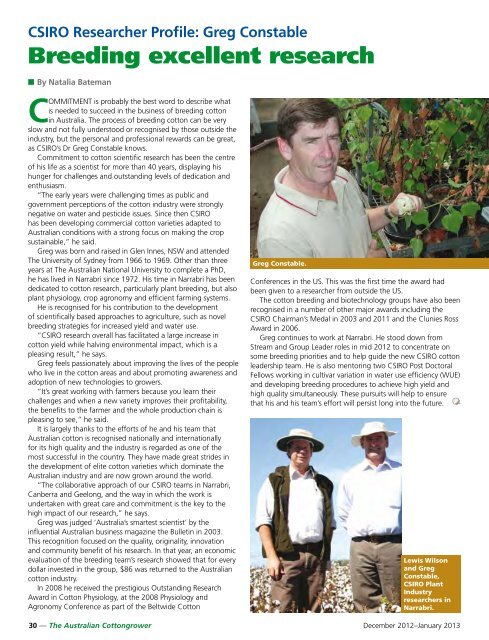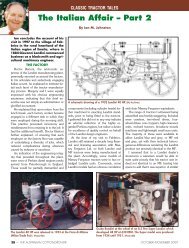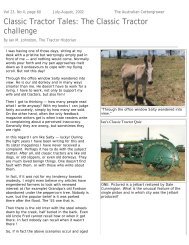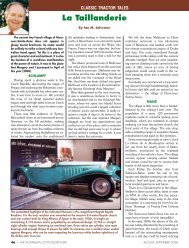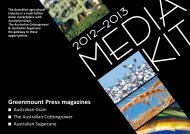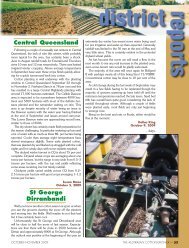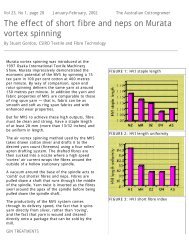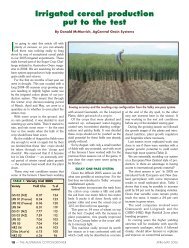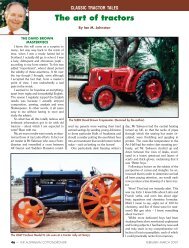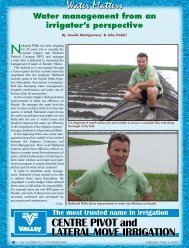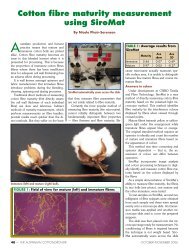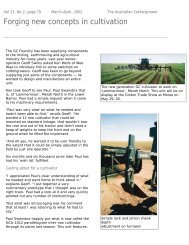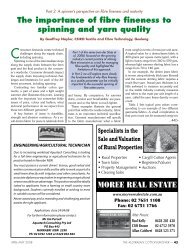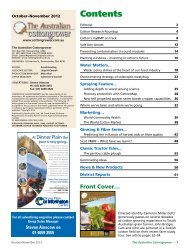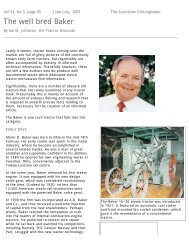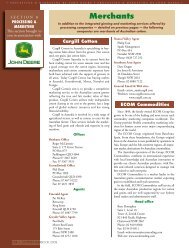cotton - Greenmount Press
cotton - Greenmount Press
cotton - Greenmount Press
Create successful ePaper yourself
Turn your PDF publications into a flip-book with our unique Google optimized e-Paper software.
CSIRO Researcher Profile: Greg Constable<br />
Breeding excellent research<br />
■ By Natalia Bateman<br />
COMMITMENT is probably the best word to describe what<br />
is needed to succeed in the business of breeding <strong>cotton</strong><br />
in Australia. The process of breeding <strong>cotton</strong> can be very<br />
slow and not fully understood or recognised by those outside the<br />
industry, but the personal and professional rewards can be great,<br />
as CSIRO’s Dr Greg Constable knows.<br />
Commitment to <strong>cotton</strong> scientific research has been the centre<br />
of his life as a scientist for more than 40 years, displaying his<br />
hunger for challenges and outstanding levels of dedication and<br />
enthusiasm.<br />
“The early years were challenging times as public and<br />
government perceptions of the <strong>cotton</strong> industry were strongly<br />
negative on water and pesticide issues. Since then CSIRO<br />
has been developing commercial <strong>cotton</strong> varieties adapted to<br />
Australian conditions with a strong focus on making the crop<br />
sustainable,” he said.<br />
Greg was born and raised in Glen Innes, NSW and attended<br />
The University of Sydney from 1966 to 1969. Other than three<br />
years at The Australian National University to complete a PhD,<br />
he has lived in Narrabri since 1972. His time in Narrabri has been<br />
dedicated to <strong>cotton</strong> research, particularly plant breeding, but also<br />
plant physiology, crop agronomy and efficient farming systems.<br />
He is recognised for his contribution to the development<br />
of scientifically based approaches to agriculture, such as novel<br />
breeding strategies for increased yield and water use.<br />
“CSIRO research overall has facilitated a large increase in<br />
<strong>cotton</strong> yield while halving environmental impact, which is a<br />
pleasing result,” he says.<br />
Greg feels passionately about improving the lives of the people<br />
who live in the <strong>cotton</strong> areas and about promoting awareness and<br />
adoption of new technologies to growers.<br />
“It’s great working with farmers because you learn their<br />
challenges and when a new variety improves their profitability,<br />
the benefits to the farmer and the whole production chain is<br />
pleasing to see,” he said.<br />
It is largely thanks to the efforts of he and his team that<br />
Australian <strong>cotton</strong> is recognised nationally and internationally<br />
for its high quality and the industry is regarded as one of the<br />
most successful in the country. They have made great strides in<br />
the development of elite <strong>cotton</strong> varieties which dominate the<br />
Australian industry and are now grown around the world.<br />
“The collaborative approach of our CSIRO teams in Narrabri,<br />
Canberra and Geelong, and the way in which the work is<br />
undertaken with great care and commitment is the key to the<br />
high impact of our research,” he says.<br />
Greg was judged ‘Australia’s smartest scientist’ by the<br />
influential Australian business magazine the Bulletin in 2003.<br />
This recognition focused on the quality, originality, innovation<br />
and community benefit of his research. In that year, an economic<br />
evaluation of the breeding team’s research showed that for every<br />
dollar invested in the group, $86 was returned to the Australian<br />
<strong>cotton</strong> industry.<br />
In 2008 he received the prestigious Outstanding Research<br />
Award in Cotton Physiology, at the 2008 Physiology and<br />
Agronomy Conference as part of the Beltwide Cotton<br />
Greg Constable.<br />
Conferences in the US. This was the first time the award had<br />
been given to a researcher from outside the US.<br />
The <strong>cotton</strong> breeding and biotechnology groups have also been<br />
recognised in a number of other major awards including the<br />
CSIRO Chairman’s Medal in 2003 and 2011 and the Clunies Ross<br />
Award in 2006.<br />
Greg continues to work at Narrabri. He stood down from<br />
Stream and Group Leader roles in mid 2012 to concentrate on<br />
some breeding priorities and to help guide the new CSIRO <strong>cotton</strong><br />
leadership team. He is also mentoring two CSIRO Post Doctoral<br />
Fellows working in cultivar variation in water use efficiency (WUE)<br />
and developing breeding procedures to achieve high yield and<br />
high quality simultaneously. These pursuits will help to ensure<br />
that his and his team’s effort will persist long into the future.<br />
Lewis Wilson<br />
and Greg<br />
Constable,<br />
CSIRO Plant<br />
Industry<br />
researchers in<br />
Narrabri.<br />
30 — The Australian Cottongrower December 2012–January 2013


